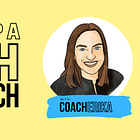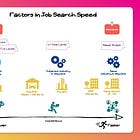2024 Year-end AMA
2024 was another brutal tech job market, and 2025 is looking like more of the same. Check these questions from active job seekers and answers from Coach Erika. Plus, ask your own question!
👋 Hey, it’s 📣 Coach Erika! Welcome to a ✨ free subscriber edition ✨ of The Career Whispers. Each week, I tackle reader questions about tech careers: how to get one, how to navigate them, and how to grow and thrive in your role.
For me, the end of the year is a time for reflection and a time to recharge for the year to come. For those of you in an active job search, I encourage you to take time to write down 3-5 gains from your job search, even if it’s ongoing. These gains can be anything. Some ideas:
social joy from reconnecting with old colleagues and networking
respinning your resume into something that makes you feel more competent and powerful
taking those first steps to apply (especially if you did a lot of prep to get there!)
getting recruiter calls and phone screens and knowing that means you have candidate-market fit
Last year, I wrote an article about my annual reflection process. Substack rated it a must-read, and you might find that approach particularly useful if your year was bumpy.
For those planning a job search in 2025, I encourage you to use the holidays to recharge and reinforce your sense of belonging and ability. Get your batteries charged and set your expectations for a more challenging job search, especially if the last time you searched for a job was prior to mid-2022.
Today’s post is a shortened version of an AMA I did last week for an online community. The information I shared is useful for all tech workers, so I wanted to share it more broadly. I simplified some of the questions to make it easier for you to read and digest.
In each answer, I link to one or two relevant TCW articles to enable deeper exploration if the question interests you. By linking to other writings, I hope this AMA will also serve as a compendium of articles that you can use now or in the future to unlock a new role with ease and confidence.
This is my last post before Christmas, and I want to also take a moment to express my gratitude to each of you for giving me 5,000+ reasons to sit behind this keyboard and clank-clank-clank out what I know about tech careers. You are the reason I write, and I thank you for investing in yourself and taking the time to read. Without you, there would be no reason for me to Whisper 🤫
If you have someone in your world who is job searching now or planning to in 2025, consider gifting them a one-year paid subscription to The Career Whispers so they don’t have to do it the hard way. Many readers who come in from gift subscriptions say it was the most useful gift of the year.
Let’s dive in ↓
AMA with Coach Erika December 2024
I’m Coach Erika. Since 2020, I've coached 280+ tech job seekers on how to write a door-opening resume, woo recruiters and hiring managers, impress interviewers, and land and negotiate job offers in Big Tech and rocket ship startups.
In my 15 years in tech, I’ve built and scaled unicorn startups, raised over $3B in venture capital, taken 2 startups public, and grown organizations from ~30 to 2000+. I’m passionate about helping people unlock career-catapulting roles because doing so for myself paved the way to a fulfilling and fruitful career.
Since 2020, I’ve become the most sought-after job search coach in tech, partly because of my high client success rate (93%+). My advice is timely and relevant because I am a tech worker, too. I know exactly what the candidate experience feels like because I’ve been there myself – as both a candidate and an interviewer. In the last 10 years, I’ve interviewed over 1100+ people, and hired 75+ people into my own teams.
Ask me anything about job searching, career shifts, interview prep, negotiating an offer, resume advice, or growing and thriving in tech roles!
PS: If you’re job searching in 2025, consider joining an upcoming cohort of my Lenny-recommended 4.9 ⭐️ Teeing up your Tech Job Search workshop. Apply here.
Q: From your experience, what questions should candidates ask more often at initial interviews but don't?
A: Candidates often forget that they are supposed to be interviewing the company as much as they are being interviewed by the company.
You always want to pass an interview, of course. But if you can coach yourself to ask tough questions to the interviewer (and get past the idea that this will make you seem bossy or demanding), you can go beyond passing the interview and impress them instead. When you impress interviewers, it makes them more enthusiastic about working with you. This means faster, better offers and an easier compensation negotiation process.
The best way to impress interviewers is to establish that you have two goals in an initial interview:
(1) pass the interview, and move on to the next round
(2) collect information that will help you decide if you want the role
Once you clarify your goals, it's time to do some research into the company, the role, the product, the team you're interviewing with. To impress interviewers and get more information out of them, you need to ask "high-signal questions" — these are questions that get you critical information and also signal to interviewers that you have done your homework.
Some categories of questions I think every candidate should ask:
- industry dynamics
- company and team strategy
- competitive landscape
- team goals and contribution to company strategy
- goals the interviewer has for the role
- manager's leadership (only if you are interviewing with the manager or someone who reports to them. Skip these questions in recruiter screens, as recruiters often won't have a lot of insights on this front, and other questions will get you more useful signal).
If you are curious about this approach, you can read more about the impact of asking high-signal questions and learn how to formulate them yourself here:
As a bonus, here’s another article with questions to ask in recruiter screens:
Q: I think my experience may be a little too "all over the place" for recruiters, as I'm having trouble getting past the ATS for interviews. I've sent tons of applications into the void and am feeling really stressed. Advice?
A: Varied experience that all adds to your dimensionality and will make you more competent in the role, which is great! We just need to get you through the door.
When it comes to job searching, employers just want to find the right person to fit the role gap they have. They need to know that you have expertise in that specific area.
I've written about the importance of focusing your job search on a Niche of One and then adapting your resume and LinkedIn to advertise your expertise. The worst approach you can take in any job market is to leave it up to the ATS or recruiter to figure out how to leverage you.
Here’s my step by step guide to defining your Niche of One and injecting it into your resume and LinkedIn for a more focused and productive job search:
And here’s a 4-hour job search plan that will keep you focused and sane in your job search:
Q: I am not into tech but I have always been interested in pivoting into tech. I am based in Europe. What advice do you have for me?
A: Industry changes are always tricky, especially trying to shift into tech right now as things are downturned in most US tech companies due to the end of the long zero percent interest rate period, amongst other factors.
Some good news is that many large US tech companies are expanding geographically to get access to different talent, lower cost geos, and expanding their footprint in parts of the world where they have growing user bases. You can see this in particular in Ukraine, Poland, Romania, but also in Finland any many other European countries, along with India, Mexico, Brazil, Canada and other countries around the world.
If you want to make a pivot into the tech industry, the easiest way will always be to leverage your existing skill set. In your case, since you have revenue-focused experience, you would look for companies hiring roles in revenue operations or finance and key in on those roles that would value your prior experience in purchase and sales channel data analysis and/or sales strategy.
My best strategies for making career pivots in tech in the current job climate: https://thecareerwhispers.substack.com/p/avoid-the-sunk-cost-fallacy-and-make
Q: For 6 years I’ve been consulting with startups on building MVPs. I really want to move in-house to scale products. In this market it seems people want to only hire those who have equivalent experience with their domain and scale. How might I position myself to break into larger organizations? Should I do that, or focus on the startup space aligned with my recent experience?
A: The best way in is always the door that is right in front of you. From what I am reading, you are an expert at zero-to-one product design and launch (MVP) but not as experienced with scaling products and growth engineering. My advice would be to pick the company you've worked with to design and launch their MVP. Pick the one you believe has the highest chance of scaling up as large as you want, and see if they have a role for you. This is usually the fastest way to your end goal. Get the experience scaling, then roofshot over to a larger organization when you have learned how to scale.
If you want to go straight into larger organizations, you are right that they are currently in the mode of hiring for expertise over potential; this is in part because of market conditions. There are usually smaller pockets within larger organizations that have more nascent products and want to find people who are scrappier, more entrepreneurial, and more familiar with current/relevant early scale approaches. Find those pockets and network, network, network into interviews.
ps: articles I’ve written that may help you navigate this career shift:
Q: What advice do you have for an unemployed senior IC (individual contributor) who wants to move into people management roles?
A: It’s extraordinarily hard to convince a new employer in this market (or any market) to take a big risk by offering a level-up title or scope. My advice to anyone trying to break into management roles for the first time is to do it from within a company. If you are unemployed, land the IC role first and then earn your way into a manager role. It's almost always the fastest way into management.
It’s also usually the fastest way to pivot roles, for what it’s worth. I can’t count how many former recruiting coordinators I’ve seen pivot internally into analytics, data science, engineering, growth, and other roles. Those same, talented individuals would have never even made it through an ATS filter. They were smart to pivot internally.
Q: I’m a Sr. PM trying to land something in this tough market. I’m seeing orgs flattening and fewer roles posted these days, which combined with the AI wave, makes me think I need to change my approach. Would becoming a founder help me land bigger titles with higher impact should I choose to go back to a corporate job in the future?
A: As a former founder myself, all I can say is that being a founder takes all of your time, energy, your soul, even your bone marrow. I would only go into a founder journey if you feel absolutely called to it. That said, I personally love hiring former founders and PMs who have founded a side hustle and built something independently from scratch. Pragmatic entrepreneurship maps nicely into internal PM roles.
Q: There have been widespread layoffs in the industry and I’m looking to pivot to tech from advertising/media, but it’s such a tough market. There are already qualified candidates that have tech experience. What are your tips for a door-opening resume or a way to stand out from the crowd?
A: You have a popular concern, given how many others asked similar questions!
Two ways to help your resume stand out:
(1) Map your past experience to the roles you are targeting. Do the hard work for them, and show that you already have the skills for the role. Make it clear that there is no risk to hiring you even though you aren’t a veteran of the industry.
(2) Be very direct (and focused). In the first three lines of your resume, call out the specific role you desire, the company type, and the industry. Be opinionated.
Please check out my other responses in this AMA to get additional tips on role and industry pivots and mapping your skills into new roles. Also, check out these articles I wrote for people facing similar situations to yours:
Actionable tips for making career pivots in the current job climate:
Niche of One Job Searching
Resume optimization
Translating resumes to LinkedIn
Q: What do CEOs/executive recruiters look for in Head of Products/VP of Products in startups? I want to reverse engineer the skillset and focus on the right upskilling.
A: Here's how I would approach this:
(1) find 30 job descriptions for roles you're interested in, throw them into a single doc, upload to your favorite LLM and ask it to look for patterns and keywords. That will give you a rough sense of what skills you may need to emphasize/develop/shore up.
(2) find a headhunter who specializes in this role and level, and ask them. It might take time to find one who will talk to you, but the conversation would be gold.
(3) acknowledge that this role is very senior, and the more senior you get, the less "templatized" the role tends to be. Head of Product at one company could be completely focused on growth engineering. At another company, they could be an ML expert crunching data all day. At another company, they might be implementing tools like JIRA and processes for performance management, hiring, and roadmap planning for the PM org. It really is all over the map, especially as you look at smaller companies.
This process will probably lead you to look at job descriptions for Head of PM / VP of Product roles that you actually like, at companies you actually want to work for. And then use that to drive your development goals and roadmap 🚀
Q: I currently work in Big Tech and have had a strong career path (IC to manager in 3 years). I’m trying to find a role that will allow me to relocate to Switzerland. Job searching so far has been a frustrating, with no results. I've shifted my CV, networked, but nothing materializes. I think it’s because jobs like my current one don’t really exist in Switzerland. What would be your advice to get noticed by recruiters in a different job market / geo?
A: Any time you are trying to make one big shift, your top goal is localization. You need to map your value proposition onto the new team / product / market, so that friends, companies, and recruiters look at your resume / CV / LinkedIn profile and go, "aha! I know exactly what role they fit in my organization!"
Some actionable and tactical tips:
BIG congrats on the high velocity career! Make sure it shows on LinkedIn and in your CV. Having that connecting line showing a promotion is a big deal.
Consider if your short duration as a manager is a problem. Most companies want to promote from within for first-time managers, since they know the person and their subject matter expertise. If you haven't been a manager longer than 2-3 years but are looking for manager roles, you might consider looking for IC roles instead and build back to manager roles.
Map, map, map. You say roles like yours don't exist in Switzerland, but I find this hard to believe. It's more likely that they exist but are called something else. Find out what jobs encapsulate the skills, expertise, and job responsibilities you currently have, and then switch the CV and LinkedIn to use the local nomenclature. Reset your job alerts, and network with people using the local title.
I hope this helps unlock your search!
ps: some additional thoughts I've shared on debugging a job search:
Q: I had to resign from my last role because I burned out from full-time work + caregiving. With a 1+ year career gap, I'm eager to land something new. I recently learned about "returnships" for people with gaps due to caregiving or other reasons. What are your thoughts about these programs? Are they worth it, and how can I best position myself for one?
A: I’m not super familiar with returnship programs, but I have seen many people go from bootcamps into apprenticeship programs with great success. The biggest challenge with these programs is that there are often a high volume of applicants, so it can (counterintuitively) become more competitive than just going after regular full time roles.
The teams that run these programs tend to be isolated from the rest of the recruiting team, too, so when you apply to the returnship program or apprenticeship program, do not expect the right hand to talk to the left hand within the company. You can view your candidacy for each role as effectively independent.
Given that your gap is relatively small (less than 3 years), my recommendation is a dual-path approach: apply for returnship programs and in parallel apply for full time roles where you feel qualified and interested.
There are also fast tracks if you are able and willing to work for free for a while to bolster your portfolio and show more recent, relevant work experience. Some tips for speeding up a job search here:
🎉 That’s a wrap! I hope this helps you navigate your career and thrive. Got a question to add to the AMA? Use the comments below.
Hey, friend! If you read the full post but by some miracle are not yet subscribed, here, let me help you with that:
Become a paid subscriber to support my writing and get access to every post, across these thoughtfully crafted career experimentation series:
JOB SEARCH DIARIES
THE WEEKLY WHISPER
DEBUGGING YOUR JOB SEARCH
MVIP (MINIMUM VIABLE INTERVIEW PREP)
CLEVER GUERRILLA
BONUS EDITIONS and more (see all the paid subscriber benefits here)
Guess what? This newsletter is an educational resource and can probably be expensed through your manager or your company's L&D budget. Here is a template I wrote for you to use when asking your manager. For subscription details, see the About page.
ps: You can also check out coacherika.co for free resources, resume help, and various coaching options, including my very popular (Lenny Rachitsky recommended) TUYJS Workshop. Follow me on Substack, YouTube, and LinkedIn to stay in touch. Subscribe to this newsletter to receive uncommon tech career advice and experimentation ideas 💛

















